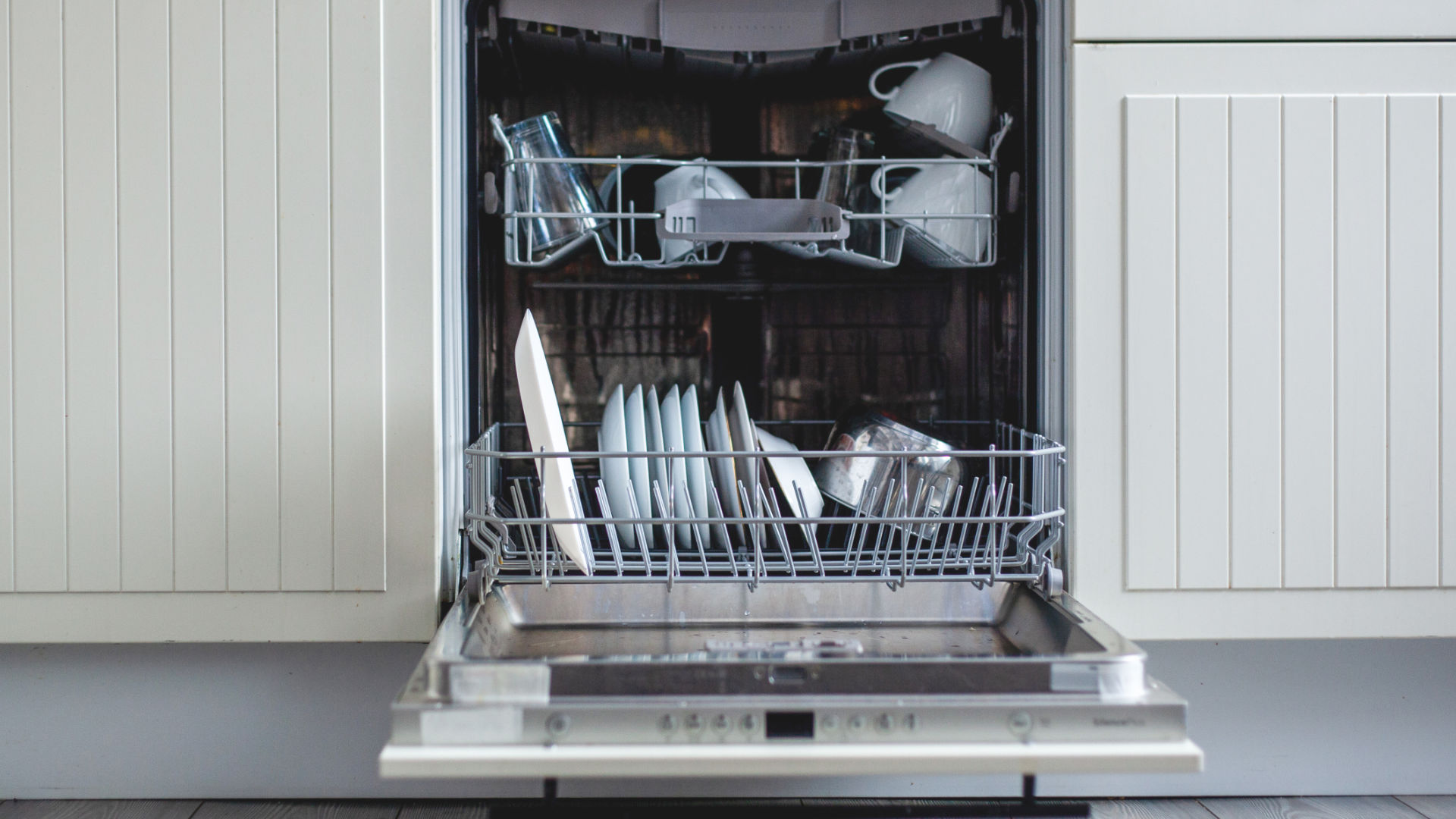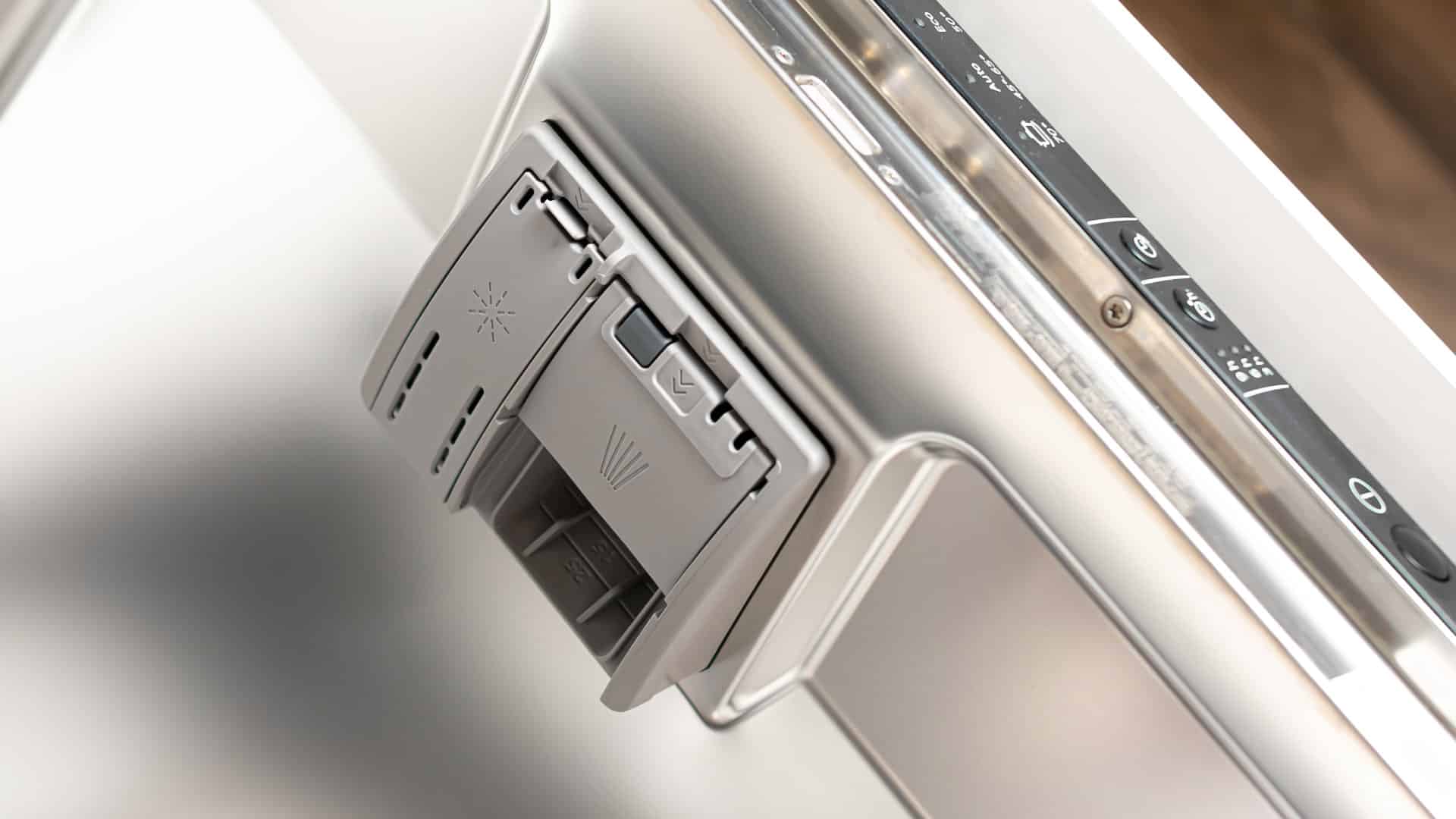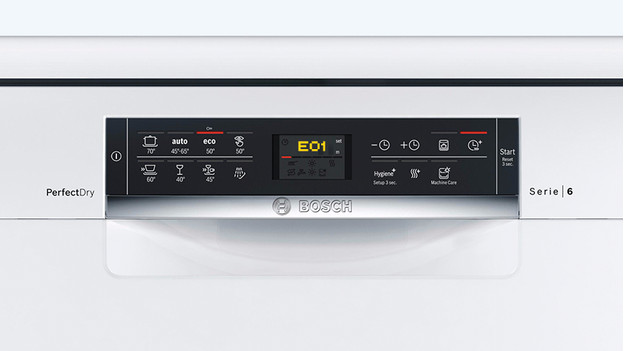Bosch dishwashers are known for their efficiency and durability. But like any appliance, they can face issues.
The most common problem with a Bosch dishwasher is often related to drainage. Many users find their dishwasher does not drain water properly, leading to standing water inside. This problem can be frustrating and disrupt your kitchen routine. Understanding why this issue happens can help you address it.
Drainage problems may arise from a clogged filter, a blocked drain hose, or a malfunctioning pump. Bosch dishwashers, like any complex machines, require regular maintenance to function smoothly. Knowing the root causes can save you time and money. With some basic troubleshooting, you can often fix these problems yourself. This guide will help you identify and resolve common drainage issues, ensuring your Bosch dishwasher works efficiently.

Credit: fleetappliance.com
Contents
Bosch Dishwasher Basics
Bosch dishwashers are popular due to their reliability and advanced technology. They are designed to offer efficient cleaning with minimal noise. These dishwashers come in various models, each with unique features and settings. Knowing the basics helps users understand their dishwashers better. This knowledge can also aid in identifying common problems.
Design And Features
Bosch dishwashers have a sleek design that fits modern kitchens. The stainless steel finish is durable and easy to clean. Inside, the racks are adjustable, accommodating different dish sizes. Many models include a third rack for utensils. The touch controls are intuitive and user-friendly. These dishwashers often have energy-efficient ratings, saving on utility bills. They also feature multiple wash cycles for different needs.
Common Usage
Users often select Bosch for its quiet operation. It’s perfect for open-plan living spaces. The various wash cycles suit different dishwashing needs. Heavy cycles handle pots and pans. Quick cycles clean lightly soiled dishes fast. Regular maintenance ensures the dishwasher runs smoothly. This includes cleaning filters and checking spray arms. Proper loading prevents damage and ensures efficient cleaning.
Typical Problems Encountered
Dealing with a malfunctioning Bosch dishwasher can be quite frustrating, especially when you’re relying on it to do the heavy lifting after a family meal. While Bosch dishwashers are known for their reliability, certain issues tend to crop up more frequently. Understanding these typical problems can help you troubleshoot effectively and get your dishwasher back to running smoothly.
Water Leakage Issues
One of the most common issues with Bosch dishwashers is water leakage. Imagine getting ready for a relaxing evening, only to find a puddle of water seeping from your dishwasher onto your kitchen floor. This can happen due to a loose door gasket or a clogged drainage system.
Check the door seal for any signs of wear or damage. A simple replacement might be all you need to fix the problem. Also, examine the drainage hose for clogs that could be causing water to back up.
Have you ever wondered how often you should inspect these components? Regular checks can prevent bigger issues down the road.
Dishwasher Not Starting
Another frequent issue is the dishwasher not starting. Picture this: you’ve loaded the dishwasher, pressed the start button, and nothing happens. This can be caused by a faulty door latch or an electrical issue.
Ensure the door is closing properly. If the latch is broken, it will prevent the dishwasher from starting. Sometimes, the solution is as simple as adjusting the latch to get it to engage correctly.
If the problem persists, check the power supply. Is the dishwasher plugged in securely? A loose plug could be the culprit behind the issue.
Have you ever thought about how a simple reset of the circuit breaker can sometimes resolve the problem?
By addressing these common issues, you can ensure your Bosch dishwasher runs smoothly, saving you time and effort in the kitchen. Remember, regular maintenance can help prevent many of these problems from occurring in the first place.
Troubleshooting Water Leaks
A common issue with Bosch dishwashers is water leaks caused by a faulty door seal. This problem often leads to puddles forming on the kitchen floor during operation. Checking and replacing the door seal can help prevent leaks and ensure efficient dishwasher performance.
Dealing with a water leak in your Bosch dishwasher can be frustrating. But don’t worry, most issues can be resolved with a little troubleshooting. Water leaks are often caused by simple problems that you can fix yourself. Imagine you’re ready to wash dishes after a lovely dinner, only to find water pooling beneath your dishwasher. Let’s dive into how you can tackle this common issue. ###Inspecting Door Seals
Begin by checking the door seals. These rubber gaskets are supposed to keep water inside. If they are cracked or worn out, water can escape. Touch the seals—do they feel smooth or are there visible gaps? If there are gaps, it’s time to replace them. Replacement seals are available online or at appliance stores. Make sure you choose the right model for your Bosch dishwasher. This simple fix might be all you need to stop the leak. ###Checking For Hose Damage
Another common culprit for leaks is hose damage. Take a peek at the hoses behind your dishwasher. These connect water to and from the appliance. A small crack or loose connection can cause a big mess. Look for kinks, cracks, or signs of wear. If you spot any damage, it’s best to replace the hose. You can find replacement hoses that fit Bosch dishwashers easily. Secure the connections tightly to ensure no water escapes. Have you ever noticed a leak only when the dishwasher is running? This might indicate a hose issue. Addressing these simple problems can prevent larger issues down the road. Why let a small leak ruin your day when a quick inspection can save you time and money? Consider the peace of mind that comes from knowing you’ve tackled these common problems head-on.
Credit: viaappliance.com
Resolving Power Problems
Bosch dishwashers often face the issue of not starting due to power problems. This can stem from faulty wiring or a tripped breaker. Resolving such issues involves checking the power supply and ensuring the dishwasher is correctly plugged in.
If your Bosch dishwasher isn’t powering on, it can be frustrating. The good news is, resolving power problems is often straightforward. With a few simple checks, you can have your appliance running smoothly again.Checking Power Supply
Before diving into complex solutions, start with the basics. Is your dishwasher plugged in securely? Sometimes, the plug can become loose, especially if it’s in a busy kitchen area. Next, check the electrical outlet. Try plugging another appliance into the same outlet to see if it works. This can help determine if the issue is with the outlet itself. Make sure your circuit breaker hasn’t tripped. Head to your home’s electrical panel and check for any switches in the off position. Resetting the breaker may be all it takes to restore power.Resetting The Dishwasher
If the power supply isn’t the issue, a simple reset might do the trick. Unplug your dishwasher from the power source. Wait for about 10 minutes before plugging it back in. This can help clear any minor glitches in the system. Some Bosch models have a reset button. Check your manual to locate it and follow the instructions provided. This can sometimes resolve issues without the need for further troubleshooting. Have you ever thought about how much technology runs our daily lives? A simple reset can often solve what seems like a major problem. If only all life’s issues had a reset button! By taking these steps, you may find your dishwasher is back to its usual self. If not, it might be time to consult a professional. But for many, these simple checks can save both time and money.Addressing Poor Cleaning Performance
Addressing poor cleaning performance in your Bosch dishwasher can be frustrating, especially after a dinner party when you expect spotless dishes. Understanding the reasons behind this issue is crucial. Two common culprits are spray arm blockages and detergent dispenser malfunctions. Let’s dive into these problems and see how you can tackle them to ensure your dishwasher performs at its best.
Spray Arm Blockages
One of the most frequent issues with poor cleaning is blocked spray arms. Over time, food particles and debris can clog the tiny holes in the spray arms, reducing water pressure.
This blockage means your dishes aren’t getting the thorough rinse they need. Have you ever opened your dishwasher to find food bits still stuck to your plates? It’s a telltale sign of this problem.
To fix this, remove the spray arms and rinse them under warm water. Use a toothpick or thin wire to clear any stubborn debris.
Regularly checking and cleaning these arms can prevent future blockages. Consistent maintenance ensures your dishwasher operates efficiently.
Detergent Dispenser Malfunctions
Another common cleaning issue arises from the detergent dispenser not opening properly. If the dispenser is jammed or doesn’t open during the cycle, your dishes won’t get the cleaning power they need.
Imagine expecting sparkling glasses only to find them spotty due to detergent not being released. This can be caused by sticky detergent residue or a mechanical fault.
To address this, clean the dispenser thoroughly, ensuring no residue is blocking its operation. If the problem persists, check if the latch mechanism is working correctly.
Sometimes, a simple adjustment or replacement part can solve the issue. Keeping the dispenser clean ensures your dishwasher has the right tools to do its job.
Have you encountered these issues with your Bosch dishwasher? Addressing them promptly not only saves you time but also improves your dishwasher’s efficiency. Regular maintenance and a little troubleshooting go a long way in ensuring your dishes come out sparkling clean every time.
Fixing Drainage Problems
A frequent issue with Bosch dishwashers is drainage problems. Blockages in the filter or drain hose often cause water to accumulate inside. Regular cleaning of these parts can help prevent clogs and ensure smooth operation.
If your Bosch dishwasher isn’t draining properly, you’re not alone. Drainage problems are common and can disrupt your kitchen routine. But don’t worry, fixing these issues is usually straightforward. Let’s explore some practical steps you can take to tackle drainage problems efficiently.Unclogging The Drain Hose
One frequent issue is a clogged drain hose. This can happen if food particles or debris build up over time. To fix this, first disconnect the dishwasher from the power supply for safety. Next, locate the drain hose, usually found at the back of the machine. Carefully detach it and check for any blockages. A simple way to clear it is by using a long, flexible brush or running water through the hose. Reattach the hose and test your dishwasher. You might be surprised how such a small step can make a big difference. Have you checked your drain hose lately?Cleaning The Filter
Another often-overlooked culprit in drainage issues is a dirty filter. A clogged filter can prevent water from draining properly, leading to standing water in the dishwasher. To clean the filter, start by removing the bottom rack of your dishwasher to access it. The filter is typically located at the base of the dishwasher. Twist and remove it following the manual’s instructions. Rinse the filter under warm water, scrubbing gently with a soft brush to remove any food particles. Reinstall the filter and run a short cycle to ensure everything’s working smoothly. Isn’t it amazing how a quick cleaning can restore your dishwasher’s efficiency? When was the last time you checked your filter? Taking these steps can resolve drainage problems and keep your Bosch dishwasher running smoothly. Remember, regular maintenance can prevent these issues from happening in the first place.Handling Strange Noises
Strange noises from your Bosch dishwasher can be quite unsettling, especially when you rely on it for the daily grind of cleaning dishes. The good news? These noises often have straightforward explanations and solutions. Understanding where they’re coming from and how to address them can save you time and money, and restore your dishwasher to its quiet efficiency.
Identifying Source Of Noise
First things first, pinpointing the source of the noise is crucial. Is it a rattling sound? A grinding noise? Open the dishwasher and give it a listen. Pay attention to the cycle it occurs in—does it happen during the wash, rinse, or drain cycle? This can provide clues about which part is causing trouble.
Check for loose items. Sometimes, the sound is as simple as a stray fork or spoon clattering against the spray arms. Inspect the lower and upper racks, ensuring no utensils have slipped through the cracks. If the noise persists, consider running an empty cycle to see if the sound remains.
Lubricating Moving Parts
If the noise seems mechanical, lubrication might be the answer. Moving parts like spray arms and the motor can occasionally need a little TLC. Use a dishwasher-safe lubricant to grease these areas. You don’t need a lot; a small amount can significantly reduce friction and noise.
Be cautious. If you’re unsure about which parts require lubrication, consult your Bosch dishwasher manual or seek advice from a professional. Over-lubricating can cause parts to malfunction, so aim for precision rather than quantity.
Could it be time to consider professional help if the noise persists? Sometimes, what sounds like a minor issue can hint at a larger problem. Addressing strange noises promptly can prevent more significant breakdowns.
Have you experienced strange noises with your dishwasher? Share your story in the comments below. Your insights could be the key to solving someone else’s dishwasher dilemma!
Maintenance Tips
Maintaining your Bosch dishwasher ensures it runs smoothly for years. Simple maintenance tips can prevent common issues and enhance performance. Focus on cleaning routines and regular check-ups to keep your dishwasher in top shape.
Regular Cleaning Routine
Clean the filter regularly. A clogged filter can affect performance. Remove food particles after each wash. This prevents blockages. Wipe the door seal with a damp cloth. Dirt can build up there. Run an empty hot wash with vinegar monthly. This removes limescale and odor. Check spray arms for debris. Clean them with a toothbrush if needed.
Periodic Professional Check-up
Schedule a professional check-up annually. Technicians can identify hidden issues. They ensure all components function correctly. Regular checks can extend the lifespan of your dishwasher. Professionals can also clean parts you can’t reach. This keeps your dishwasher efficient and reliable.

Credit: www.coolblue.be
Frequently Asked Questions
What Is The Life Expectancy Of A Bosch Dishwasher?
Bosch dishwashers typically last around 10 years with proper maintenance. Regular cleaning and timely repairs extend their lifespan. Usage frequency and water quality may also affect longevity. Consider energy-efficient models for cost savings. Bosch offers reliable performance, making them a popular choice among homeowners seeking durable appliances.
What Bosch Dishwashers Are Being Recalled?
Bosch recalled certain dishwashers due to fire hazard risks. Models manufactured from 2008 to 2013 are affected. Check Bosch’s official website for specific model numbers and recall details. Ensure your dishwasher’s safety by verifying if it is part of the recall.
What Are Problems With A Bosch Dishwasher?
Bosch dishwashers can face issues like draining problems, faulty door latch, or error codes like E24. Users often report poor drying performance or water leakage. Regular maintenance and checking for clogs can help prevent these problems. Always refer to the Bosch manual for troubleshooting specific errors.
Is It Worth Fixing A Bosch Dishwasher?
Fixing a Bosch dishwasher is often worthwhile due to its durability and quality. Consider repair costs and age. If repair costs are low compared to buying new, fixing is sensible. Bosch parts are reliable, enhancing longevity. Consult professionals for accurate diagnosis before deciding on repair or replacement.
Conclusion
Bosch dishwashers are reliable but can have common problems. Often, users face drainage issues. This can lead to water not emptying properly. Regular cleaning of filters can help. Checking for blockages in hoses is crucial too. Sometimes, a quick reset solves minor glitches.
Users should also ensure the door seals tightly. This prevents leaks. Regular maintenance is key to longevity. With some care, Bosch dishwashers can perform efficiently. Keep an eye on unusual noises. Addressing small issues early can prevent big repairs. Always refer to the manual for specific guidance.
Bosch dishwashers generally serve well with timely care.
{ “@context”: “https://schema.org”, “@type”: “FAQPage”, “mainEntity”: [ { “@type”: “Question”, “name”: “What is the life expectancy of a Bosch dishwasher?”, “acceptedAnswer”: { “@type”: “Answer”, “text”: “Bosch dishwashers typically last around 10 years with proper maintenance. Regular cleaning and timely repairs extend their lifespan. Usage frequency and water quality may also affect longevity. Consider energy-efficient models for cost savings. Bosch offers reliable performance, making them a popular choice among homeowners seeking durable appliances.” } } , { “@type”: “Question”, “name”: “What Bosch dishwashers are being recalled?”, “acceptedAnswer”: { “@type”: “Answer”, “text”: “Bosch recalled certain dishwashers due to fire hazard risks. Models manufactured from 2008 to 2013 are affected. Check Bosch’s official website for specific model numbers and recall details. Ensure your dishwasher’s safety by verifying if it is part of the recall.” } } , { “@type”: “Question”, “name”: “What are problems with a Bosch dishwasher?”, “acceptedAnswer”: { “@type”: “Answer”, “text”: “Bosch dishwashers can face issues like draining problems, faulty door latch, or error codes like E24. Users often report poor drying performance or water leakage. Regular maintenance and checking for clogs can help prevent these problems. Always refer to the Bosch manual for troubleshooting specific errors.” } } , { “@type”: “Question”, “name”: “Is it worth fixing a Bosch dishwasher?”, “acceptedAnswer”: { “@type”: “Answer”, “text”: “Fixing a Bosch dishwasher is often worthwhile due to its durability and quality. Consider repair costs and age. If repair costs are low compared to buying new, fixing is sensible. Bosch parts are reliable, enhancing longevity. Consult professionals for accurate diagnosis before deciding on repair or replacement.” } } ] }
